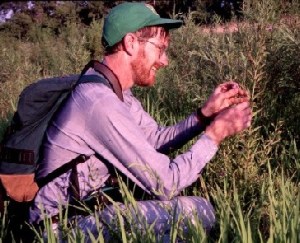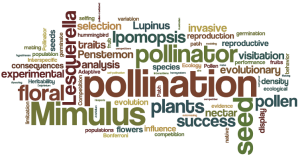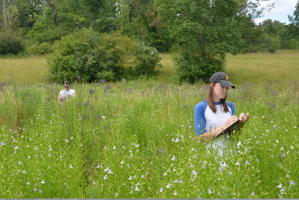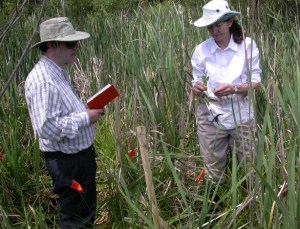Randall J. Mitchell
Professor of Biology
University of Akron
Phone: 330-972-5122
Office: ASEC E508, Lab: ASEC E513
Department of Biology, University of Akron
Akron, Ohio 44325-3908; rjm2@uakron.edu
Effects of Pollination Biology on the Evolution of Plant Mating Systems
The Principal Investigators of this project are:
- Randy Mitchell. University of Akron
- Jeff Karron. University of Wisconsin Milwaukee
- Dorset Trapnell. University of Georgia
- Emmanuelle Porcher. Muséum National d’Histoire Naturelle
- Celine Devaux. Université de Montpellier
Dr. Karron and I have been collaborating in studies of Mimulus ringens for over 20 years. We are both focused on how pollinators affect mating patterns in plants. Dr. Karron focuses more on genetic aspects of our work, including selfing rate, while I focus more on pollinator behavior and pollination biology.
Dr. Trapnell will be supervising our genotyping (microsatellites) to evaluate selfing rates and paternity success.
Dr. Porcher and Dr. Devaux are theoreticians and will be developing new models for the evolution of stable mixed mating.
As explained in more detail below, this project is aimed at evaluating whether pollinator sharing (and pollen loss when pollinators move between species) may help to stabilize mixed mating as an evolutionary strategy.
Non-technical abstract of the proposal: Evolutionary tradeoffs between outcross siring success and selfing: the role of ecological context in the stability of mixed mating systems
A major unsolved question in biology is why plant populations often maintain a mixture of two reproductive strategies. Long standing genetic theories predict that the extreme form of inbreeding known as self-fertilization should rarely co-exist with outcrossing. Yet this dual strategy is surprisingly common in nature, suggesting that existing theory does not adequately explain the maintenance of mixed mating. This project tests the hypothesis that ecological interactions among plant species help maintain dual strategies. When plant species flower together and share pollinators, pollen is often wasted on flowers of other species, reducing the benefits of cross-pollination. The researchers will evaluate this hypothesis through a combination of field studies of pollinator behavior, and molecular genetic lab studies of parentage. This research will enhance conservation of plant and pollinator communities and will help scientists understand how invasive species and habitat fragmentation influence pollination. A partnership with an economically disadvantaged K-12 school will foster improved understanding of conservation and biodiversity.
Focusing on the perennial plant Mimulus ringens, empirical and theoretical studies will investigate how pollinator sharing affects the tradeoff between outcross siring and selfing. Manipulative experiments will evaluate whether changes in co-flowering species abundance (ecological context) influence patterns of natural selection on selfing. Comparison of selfing rates, pollen limitation, floral morphology and inbreeding depression for numerous natural populations will document evolutionary response to ecological context. Innovative new models will explore the range of genetic and ecological factors that could generate stabilizing selection on mixed mating. These linked empirical and theoretical investigations will provide a broad new framework for understanding the evolution of plant mating systems.




